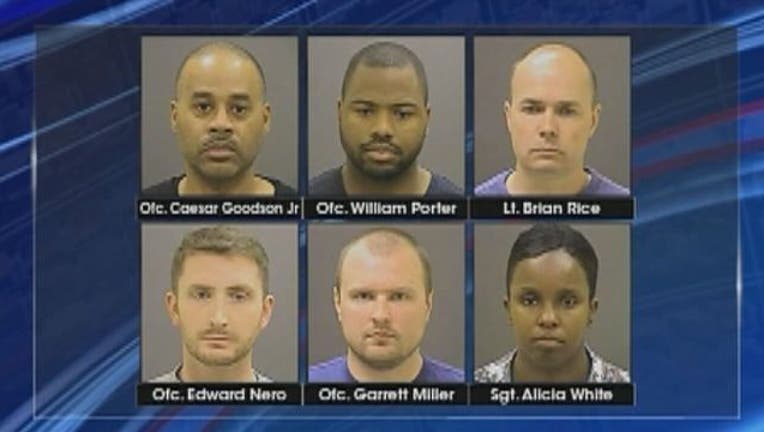Baltimore jury mulls officer's fate in Freddie Gray's death

BALTIMORE (AP) -- Jurors began deliberating the fate on Monday of the first of six officers to be tried in the death of Freddie Gray, a black man whose neck was broken in the back of a police van, adding fuel to the "Black Lives Matter" movement.
Prosecutors described Officer William Porter as indifferent to Gray's safety, repeatedly denying him medical care after he was left handcuffed and shackled but unbuckled inside a metal compartment, where he was vulnerable to a serious injury if the van stopped suddenly.
The wagon "became his casket on wheels" after Porter failed to belt him to the bench or call for a medic after he was injured, prosecutor Janice Bledsoe said in her closing arguments. Gray was arrested about seven city blocks from the station, and yet police stopped the van repeatedly and the trip became a 45-minute journey.
"With great power comes great responsibility," Bledsoe said. "Porter had the opportunity on four or five occasions to wield his power to save Freddie Gray. He abused his power. He failed his responsibility."
Porter testified that he did nothing wrong to Gray, who was arrested after running from officers in his neighborhood, and his attorney Joseph Murtha said nothing more than conjecture and speculation implicates his client.
Gray's death was a "horrific tragedy," Murtha said, but "there is literally no evidence" that Porter caused it.
"The absence of real evidence raises much more than reasonable doubt," Murtha told jurors. "This case is based on rush to judgment and fear. What's an acronym for fear? False evidence appears real."
Mayor Stephanie Rawlings-Blake urged citizens to respect the jury's decision and go about business as usual. The city also opened an emergency operations center and contacted outside law enforcement agencies to coordinate any necessary response.
Demonstrations were initially peaceful following the death of Freddie Gray on April 19. But unrest broke out after his funeral, prompting a curfew and bringing in the National Guard amid some of the worst rioting since 1968.
Porter faces up to 25 years in prison if convicted of all charges: manslaughter, assault, reckless endangerment and misconduct in office. Baltimore Circuit Judge Barry Williams told jurors how to determine each charge:
-- Manslaughter means he acted in a "grossly negligent manner" and "created a high degree of risk to human life."
-- Assault also means gross negligence.
-- Reckless endangerment means disregarding a substantial risk of death.
-- Misconduct requires an "evil motive, bad faith" and "not merely an error in judgment."
While police authorities testified that officers are obligated to follow department rules, the judge also instructed jurors that merely violating a general order or police policy does not necessarily mean Porter was negligent.
Proving someone is guilty because of something he didn't do is difficult in American jurisprudence, and more so in this case. No eyewitnesses said what happened inside the van, and no unequivocal evidence showed exactly when his neck was broken during the trip.
Prosecutors said the driver, Caesar Goodson, initially stopped because Gray was acting out inside the passenger compartment. Officers bound him more tightly at the wrists, shackled his ankles and laid him on his stomach on the floor.
The van stopped three more times as officers checked on Gray, and at one point, Porter opened the van's doors and lifted Gray to a seated position, although still unbuckled.
Prosecutors say Gray was gravely hurt at this point; Porter denied this, saying Gray wasn't exhibiting any symptoms and appeared uninjured. In any case, the van detoured to pick up another prisoner in a separate compartment before Gray finally arrived at the station in critical condition.
Porter told jurors he didn't call a medic because Gray didn't show signs of injury, pain or distress, and said only "yes" when he asked if he'd like to go to the hospital. He testified that he told Goodson to take him there, because while he still didn't believe Gray was really hurt, he knew the jail would reject a prisoner claiming injury. He told investigators that Gray had been kicking inside the van at a previous stop, and "he didn't appear hurt in any way, shape or form."
Other witnesses also testified that the driver was responsible for buckling Gray to the bench. Goodson faces the most serious charge of the six officers: second-degree "depraved-heart" murder.
"Whatever the verdict, we need everyone in our city to respect the judicial process," Rawlings-Blake said. "We need everyone visiting our city to respect Baltimore."

